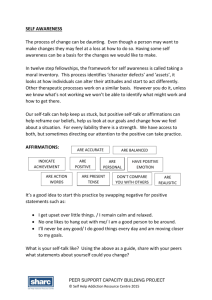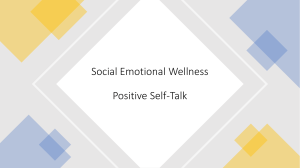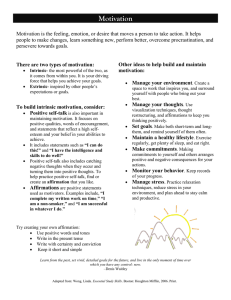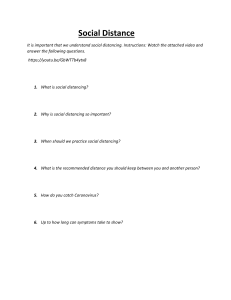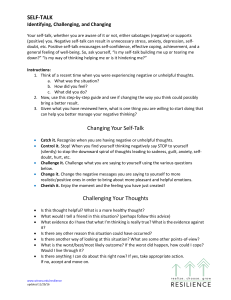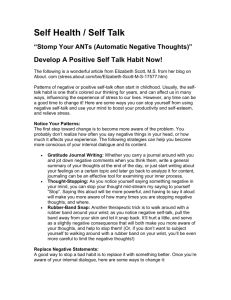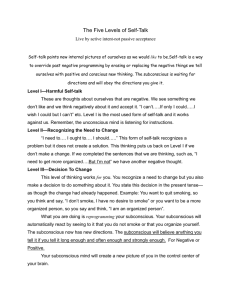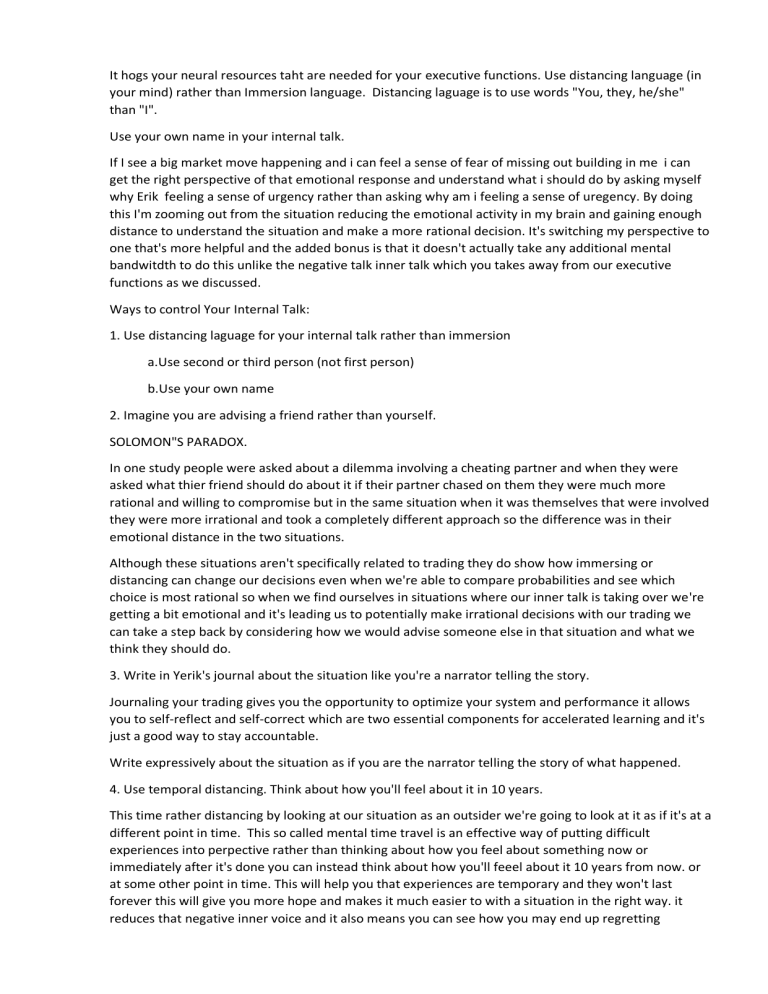
It hogs your neural resources taht are needed for your executive functions. Use distancing language (in your mind) rather than Immersion language. Distancing laguage is to use words "You, they, he/she" than "I". Use your own name in your internal talk. If I see a big market move happening and i can feel a sense of fear of missing out building in me i can get the right perspective of that emotional response and understand what i should do by asking myself why Erik feeling a sense of urgency rather than asking why am i feeling a sense of uregency. By doing this I'm zooming out from the situation reducing the emotional activity in my brain and gaining enough distance to understand the situation and make a more rational decision. It's switching my perspective to one that's more helpful and the added bonus is that it doesn't actually take any additional mental bandwitdth to do this unlike the negative talk inner talk which you takes away from our executive functions as we discussed. Ways to control Your Internal Talk: 1. Use distancing laguage for your internal talk rather than immersion a.Use second or third person (not first person) b.Use your own name 2. Imagine you are advising a friend rather than yourself. SOLOMON"S PARADOX. In one study people were asked about a dilemma involving a cheating partner and when they were asked what thier friend should do about it if their partner chased on them they were much more rational and willing to compromise but in the same situation when it was themselves that were involved they were more irrational and took a completely different approach so the difference was in their emotional distance in the two situations. Although these situations aren't specifically related to trading they do show how immersing or distancing can change our decisions even when we're able to compare probabilities and see which choice is most rational so when we find ourselves in situations where our inner talk is taking over we're getting a bit emotional and it's leading us to potentially make irrational decisions with our trading we can take a step back by considering how we would advise someone else in that situation and what we think they should do. 3. Write in Yerik's journal about the situation like you're a narrator telling the story. Journaling your trading gives you the opportunity to optimize your system and performance it allows you to self-reflect and self-correct which are two essential components for accelerated learning and it's just a good way to stay accountable. Write expressively about the situation as if you are the narrator telling the story of what happened. 4. Use temporal distancing. Think about how you'll feel about it in 10 years. This time rather distancing by looking at our situation as an outsider we're going to look at it as if it's at a different point in time. This so called mental time travel is an effective way of putting difficult experiences into perpective rather than thinking about how you feel about something now or immediately after it's done you can instead think about how you'll feeel about it 10 years from now. or at some other point in time. This will help you that experiences are temporary and they won't last forever this will give you more hope and makes it much easier to with a situation in the right way. it reduces that negative inner voice and it also means you can see how you may end up regretting particular decisions in the future as well. you know you're making a decision that you know is not right for your trading if you think about how you feel about it in 10 years then you're not going to care about satisfying that short-term need. You're going to be thinking about the expense it will have on your longterm progress. Think about how the current situation compares to previous experinces you got through. For example how your ancestors would have thought about it. It's like having A board of advisors in your mind. 5. Reframe the situation as a challenge rather than a threat. You see many negative things that we encounter aren't actually that negative it's just the way we're looking at them others may think differently. You see when we encounter potentially stressful situations we assess that stressful situation by essentially asking ourselves two questions: 1. What is required of me? 2. Do I have the resources to cope? If we conclude that we do have what's needed we'll see the situation as a challenge if we think we don't we'll see it as a threat. Unfortunately though there's a physiological difference that takes place depending on whether it's a challenge or a threat to us. Both have similarities as speeding up our heart rate but if we see it as a threat our vasculature will constrict and give less room for blood to flow, if we see it as a challenge the vasculature relaxes. When we see stressful event as a threat we'll use immersive self-talk and when it's a challenge we'll use more distant self-talk. So the way we talk about the situation will change our inner voice and can lead to a more constructive framing of the situation. One way to reframe the situation as a challenge instead of a threat is to: remind yourself of times you overcame similar problems in the past. However the changes in your body will reinforce the negative self-talk as well for example if you're feeling nervous and you start noticing your heart rate increasing and your palms getting sweaty that could compound the issue and lead to your inner voice getting even worse. So instead we need to reinterprete these bodily responses to help reduce the negative self-talk. For example, stress is actually good thing since it's an adaptive response that improves our preformance so when our breathing quickens our heartbeat races we need to remind ourselves that it isn't necessarily a feeling that we have to avoid it's not there to sabotage us but it could actually help us to respond to the situation and preform even better. 6. Be selective with who you talk to about negative situations. Talking your negative events to other people it's an evolution that helps keep our species alive as you have a much a better chance of overcoming a threat if there's more than one of you dealing with it. Research shown that when people share thoughts or feelings after a traumatic experience thay cope worse than people who don't share it. When we're emotional most people close to us will respond in a way that prioritizes our emotional needs instead of our cognitive needs. They see our pain and they want to give us love and validation but this means that without meaning to they're actually encouraging our negative emotions. It's almost if there are now two people or more going through your negative self-talk but outloud, You're co-ruminating. And also negative experiences can activate other negative thoughts so you may end up experiencing a domino effect that just ends up amplifying the negative emotions. Instead you need to talk to people who don't just satisfy your emotional needs and echo your thoughts but will offer cognitive support instead and help you to gain perspective to be able to address the situation correctly. Talk to people who provide cognitive support rather than just emotional support. Seek out the right people to talk about trading. 7. Achieve compensatory control through the use of rituals. The financial markets can really amplify the negative parts of us sometimes now part of this is down to the risk that's involved in trading. The ups and downs of making and losing money and part of it is because we're dealing with uncertainty. A lack of control can lead to a spike in our negative self-talk. It's now wonder that so many of traders are experiencing more self-talkwhen you're trading. In fact when people lack control they start even seeing imaginary patterns in things since their mind is simulating order so this may even be why people end up irrationally believing in particular chart patterns since their lack of control in the uncertain markets is leading their mind to simulating order for them. How much we believe in our control over a situation will also influence whether we try to achieve goals and how much effort or persistence we show. if we don't feel likewe have much control over the situation we won't put in as much effort if we feel we have a lot of control we will. If we increase our sense of control we're going to reduce negative self-talk and improve our physical health and emotional wellbeing. However there's not much way for us to control the markets. Even as a profitable trader you're still relying on probabilities. We can use something known as Compensatory Control. This is where we create order in our physical environment to provide ourselves with the order that we need inside ourselves. The physical environment we're in is intertwined with our minds it activates psychological forces inside us that affects how we think or feel. If we have order in our world it's comforting because it's predictable and easy to deal with. Creating this sort of order will act as a buffer against the negative self-talk that's encouraged from the markets. One of the ways that we can achieve this compensatory control is by creating Rituals. For example one of rituals can be to tidy your workspace before your trading session. That means your environment that you're working in is going to be much more organized. "It's a way of placing myself in a match, ordering my surroundings to match the order I seek in my head." R.Nadal Whether a ritual is produced organically or if you consciously create one and engage in it. It can still help you just the same therefore creating rituals for specific situations can lead us to putting ourselves in the states that we want to be in and to reduce the negative internal self-talk that's going to happen by feeling like we don't have control. 8. Use nature to recharge voluntary attention and experience awe. Experiencing awe is an emotion of the presence of something big or powerful that we can't easily explain and this is something that we experience often when we're in nature when we're filled with wonder our brain responds in a similar way to when people meditate or take Lsd. We're able to think beyond our own wants and needs and realize that we're not the center of the universe. Because of this our inner voice basically responds in a similar way to when we use a distancing technique.
